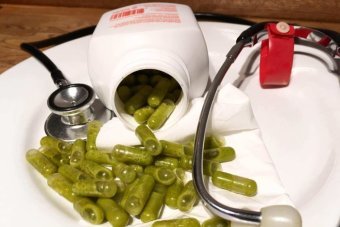Ben Oakley's life would be far more challenging without the medicinal cannabis oil he is forced to buy on the black market.
The 21-year-old suffers from a one-in-a-million neurological disease called stiff-person syndrome that causes excruciating body spasms that make him feel like he is being tasered and cause him to collapse.
Mr Oakley is one of countless users of medicinal cannabis who will benefit from the establishment of a new, world-first cannabis research centre to help address an array of legal and access issues around medicinal cannabis.
The Australian Centre for Cannabinoid Clinical and Research Excellence (ACRE) has received a $2.5 million grant from the Federal Government’s National Health and Medical Research Council to help coordinate research into medicinal cannabis use.
Mr Oakley is a classic example of how blurred the lines are at present.
Filling the gaps
He said the cannabis oil he was forced to buy illegally had proven to be a game-changer in managing his condition.
“Thanks to medicinal cannabis I haven’t had a spasm in over two years now,” he said.
“I am still breaking the law.”

Blurred lines: Medicinal cannabis pills. Blurred Lines Medicinal cannabis pills Supplied: Roll on Ben Oakley Facebook
For Mr Oakley, of Wollongong, to get on the legal course of treatment would cost $30,000 a year.
“‘There’s no way anyone can afford that,” he said.
University of Wollongong Professor Nadia Solowij has been appointed co-director of the new centre.
She has been researching the effects of long-term cannabis use on the brain for more than 25 years.
“It’s a world first in terms of the breadth and scope of what we propose for this research centre — we have five years to look at filling the gaps in medicinal cannabis being provided in the community safely,” Professor Solowij said.
Her recent research has focused on therapeutic or harmful effects of different cannabinoids.
“Some are harmful, but we think some are very beneficial and have therapeutic potential,” she said.
Professor Solowij said promising affects from cannabidiol (CBD) included reduction in psychiatric symptoms and cognitive improvements.
``Australia is at a critical junction where we can get it right because other countries have got it very wrong,`` said Professor Solowij.
Basic research lacking
Researchers in other countries where medicinal cannabis is legal say their systems are not ideal so the centre positioned Australia as a world leader.
“Australia is at a critical junction where we can get it right because other countries have got it very wrong,” said Professor Solowij.
The centre will be led by Professor Solowij together with Professor Jenny Martin from the University of Newcastle.
Experts said the centre was urgently needed because basic research was lacking and patients and doctors were having to jump through hoops to access medicinal cannabis.
There are so many gaps and it’s such a poorly regulated and formulated market,” Professor Solowij said.
“Never before has any medicine been introduced so rapidly in such a way without appropriate infrastructure and policy.”
“In many Australian states people can now access cannabinoids but it’s difficult to source reliable, consistent and suitable products.”
“Evidence is needed to guide doctors on products and dosages that are safe and effective.”
The centre will look at plant and soil science, animal models, clinical pharmacology, develop pharmaceutical products that are safe and efficacious and run major human clinical trials towards the end of the five-year study.
It will also work with doctors and health networks to monitor what is working.
It will look at what people are using, where and how they get it, what they are finding beneficial and what harm or adverse affects there might be.
Professor Solowij said this would eventually guide policy and guidelines for doctors and patients.
“It is extremely difficult for doctors to prescribe cannabis,” Professor Solowij said.
“Doctors have no idea what kind of dosage, products, where to source those products and for what kind of medical conditions cannabis is appropriate for and if it’s even appropriate.”

Ben with father Michael: They have been campaigning for better access to medical cannabis. (Supplied Michael Oakley)
Mr Oakley and his father Michael hope the new centre will improve access.
“This is a herbal substance that up until recently has been harder to get a hold of than firearms in this country. I’m glad we are seeing light at the end of this tunnel but we still have a long way to go,” Michael said.
“I have fingers crossed that this is actually going to provide the assistance needed to make it available to all of those suffering,” Ben said.
Ten other Australian universities and research institutions will be involved in the centre.
By Chloe Hart – ABC







